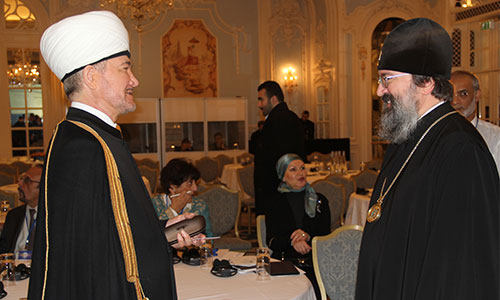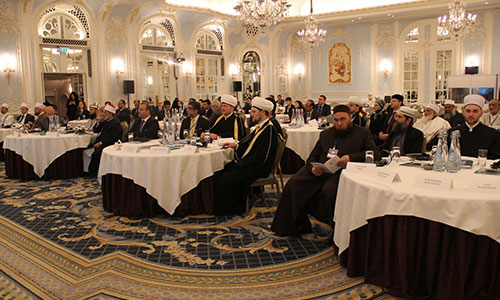From December 14 to 16 London hosted the 11th International Muslim Forum on "Religion, identity and integration, and the transformation of values".
From December 14 to 16 London hosted the 11th International Muslim Forum on "Religion, identity and integration, and the transformation of values".
The forum, founded and held annually by Russian Muslims, took place for the first time outside of Russia. London was chosen as a major European capital with a numerically significant and ethnically diverse Muslim minority population. Recently issues of identity formation, sudden changes in values and the radicalization of Muslim youth have shot to the top of the European agenda. The participants of the Forum aimed to formulate common approaches to solving problems through discussion and exchange of opinions. The organizers of the Forum were made up of the Spiritual Board of Muslims of the Russian Federation and the secretariat of the International Muslim Forum, with the support of the Muslim Council of Britain, the Council of Muftis of Russia and the Spiritual Board of Muslims of the Republic of Tatarstan.
Qur'anic humanism and the "depressurization" of the ummah: Gainutdin's main ideas
The first keynote speaker at the IMF was the spiritual leader of Russia's Muslims, mufti sheikh Ravil Gainutdin. He noted that both the nations of Europe and of the Middle East are experiencing an identity crisis. "The Muslim world is engaged in a torturous search for a new Islamic political identity and a reevaluation of their political subjectivity. And at this dramatic moment Daish has entered the scene by opportunistically exploiting the ideological and political vacuum and claiming to know the recipe for building the political future of the ummah. Daish has been able to attract a large number of youth precisely due to the fact that it has made a show of political independence and has put it immediately into practice without taking anyone or anything into consideration," said mufti Gainutdin. At the same time no other alternative agenda has been formulated for the ummah and the responsibility for this lies in large part with Muslim theologians, asserted the head of the Spiritual Board of Muslims of the Russian Federation.
According to mufti sheikh Ravil Gainutdin, the cliches to which the development of Muslim theological thought are being held hosstage, do not give people the chance to respond to the challenges of modernity. They must be overcome, the Russian mufti said, along with the narrowness of thought that has the Muslim world in its grip; the same is true of the lack of trust towards reason and the internal isolation of the ummah. Radicalism must be replaced by a reliance on humanistic principles that are contained in the very text of the sacred scripture of Muslims, the Qur'an, or in other words, one must turn to Qur'anic humanism.
The religious dimension of dialogue
The IMF participants contrasted the rhetoric of the clash of civilizations and inter-cultural conflict with their own opposing thesis about the diversity of the different elements of the human community.
In addition, Archbishop Elisei of Sourozh, who took part in the Forum as a special guest, emphasized that in the modern world when there is dialogue it is often the case that the special religious and historical qualities of the different parties are ignored, which leads to a subculture that is not receptive to tradition. What is needed is religious dialogue that allows its participants to preserve and in a friendly manner defend their convictions, said the Archbishop.

The President of the Federation of Muslim Organizations of Europe, Abullah ben Mansur (Belgium), outlined five theses that encapsulated his vision of the principles on which genuine dialogue should be based. They comprised: following the Qur'anic principle of different nations' mutual recognition of each other; realizing the religious calling not in word but through personal example; rejection of the concept of a territory of peace and a territory of unbelief; and the concept of Islam as a religion of peace and security.
The muftis of Poland, Lithuania, and Estonia, Tomas Mitskevich, Romas Yakubauskas and Ildar Muhamedshin and other speakers gave talks on the experience of coexistence between different cultures and religious traditions.
Special attention was devoted to young people
Young people comprise up to a third of the Muslim community of the United Kingdom, so that youth work and collaboration between Muslim organizations in different countries is especially important, said the secretary general of the Muslim Council of Britain, Dr Shuja Shafi in his speech to the Forum.
Undoubtedly it would be fair to say the same about the other countries of Western Europe. Social, educational and integrational work has become even more relevant in light of the unprecedented influx of refugees from the Middle East. The data cited by the head of the Tatar community of Finland, Atik Ali, are indicative: in the last six months the number of Muslims has increased from 60 thousand to 85 thousand, or in other words, by 40 per cent, thus presenting society with the challenge of socially and culturally integrating the new arrivals.
Professor Vitaly Naumkin, director of the Institute of Oriental Studies at the Russian Academy of Science, expressed his full agreement with the opinion of mufti sheikh Ravil Gainutdin that it is an identity crisis that is the primary reason for many negative social and political phenomena. In the opinion of this highly authoritative Arabic studies scholar, young people are being driven to this path of murder and violence by false values: "Young people are searching for the meaning of life and not finding it," said Naumkin.
Sheikh Husein Halawa (Ireland), General Secretary of the European Council for Fatwa and Research, expressed his firm belief that it is impossible to achieve security without a complex approach to solving the many problems of a social, economic, and ideological character.
There were also speeches by participants from Albania, Iran, Spain, Kazakhstan, Kyrgystan, Portugal, Romania, Serbia and other countries.
In the final speech, Sir Iqbal Sakranie, the founder of the Muslim Council of Britain and the most influential figure in the Muslim community of the United Kingdom, thanked the organizers of the Forum in general and mufti sheikh Ravil Gainutdin in person, and noted that there was a real need in the future for the International Muslim Forum to be held not only in Moscow but also in the capitals of other countries in order to bring together Muslim leaders.
The 11th International Muslim Forum on "Religion, identity and integration, and the transformation of values" ended with the passing of a resolution.







